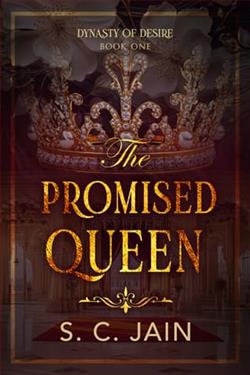Page 95 of An Academy for Liars
“I didn’t say that it has been. But I have a responsibility that you don’t, and it would be wrong—”
“In the conventional sense—”
“Wrong,” he repeated again, “if I engaged you.”
“Well, I think it would be wrong if two consenting adults denied ourselves the chance at something that could be good, great even, if we let it. Why doesn’t that count for something? Why doesn’t the pain of our own denial factor into your moral assessments?”
“I feel like you want something from me that I’m not sure I can give you.”
“Then give me what you can,” said Lennon.
And so he did.
Dante cupped the side of her neck, his fingertips carefully aligning with her artery. When they kissed, it didn’t feel like the first time. He lifted her out of her seat, splitting her thighs apart, and hitched her firmly onto his hips. As he carried her to the bedroom, Lennon kissed that moth tattoo on the hard plane of his neck, the corners of his mouth, and the soft hollow below his jaw.
On the bed, he fitted himself between her open legs and she pushed up his shirt as far as she could and then he tugged it off the rest of the way. He was even more heavily tattooed than she’d realized. The moth imagery carried down from his neck, became something of a swarm across his chest and sternum. There were other images too: a hand with a dagger pierced through it (a nod, she assumed, to the Logos initiation process) and another with an open eye embedded in the palm. Lennon spotted the ouroboros of Logos House. A spread-winged starling with an arrow through its head. But it was a small tattoo along his rib cage that caught Lennon’s attention. It read:August.
Claude had said that word months ago:It would be August all over again.
She’d thought he was referring to the month. But she realized now that it was a name.
“Something wrong?” Dante asked, peering down at her, sensing, from the feel of her body alone, the shift in her energy. That was how enmeshed they’d become. That he could feel her emotion, even when she kept her expression contained.
“No,” she said, pushing all of the thoughts of Claude out of her mind. She didn’t want them here, haunting her. Not now. “I’m fine.”
From then on, they did what they did in silence punctuated only by the rhythm of the headboard beating against the wall. As Dante moved within her, his hip bones bruising against her own with each thrust, she kept her hand clasped tight over thatAugusttattoo on his side, as if the name were an open wound and she was trying to staunch the bleeding.
For a whileafter that, things were good. As the summer came to an end, and the fall semester approached, Lennon mastered the ability to open gates to the past with an amount of stamina and skill that, frankly, startled her. She spent her evenings with Dante, largely in darkness, the two of them twined together on the couch or in bed or in the ocean once, on one of the hottest days of the summer, when even in the dead of night the rolling surf was as warm as bathwater.
“I misread him before,” said Lennon on the phone to Carly, one Saturday morning while Dante was out swimming his laps. He’d encouraged her to keep in touch with her family, something that surprised Lennon given the strict school policies at Drayton that largely discouraged any outside contact. “He’s…kind. Really kind. I want you to meet him someday, properly.”
Carly was quiet on the line. “You’re really happy, aren’t you?”
“Yes,” said Lennon, smiling as she said it. And then: “All of that stuff I wanted you to look into, you can just drop it. Actually, I thinkit’s best if you do. I think it was just the stress of school getting to me. But things are different now. Better. I think they’re the best I can ever remember them being.”
“If you say so,” said Carly.
As the days passed, Lennon very pointedly thought of Drayton less and less, wanting to preserve her time with Dante—the precious minutiae of a simple and, yes, even tedious life well lived, where she got to be the kind of person she’d always hoped to become: stable, confident, and entirely fulfilled. But despite her longing for things to remain the same, Drayton beckoned.
“You’re ready,” said Dante that evening, as they prepared to leave for Eileen’s house, where Lennon would demonstrate all that she’d learned that summer to the vice-chancellor. Both she and Dante had dressed up for the occasion, Dante in a collared shirt and Lennon in a pair of well-ironed slacks and a blouse they’d purchased from a shop in town.
“But what if I make a mess of it?” Lennon asked, putting words to the anxiety that had plagued her since the day Dante had first put forth the idea of her opening gates to the past.
“You won’t,” he said. “You’re their hope of salvation, and tonight you’ll make Eileen see that clearly.”
After dinner, they drove up the sun-scorched coast to Charleston, a trip that took just shy of two hours. Eileen lived in a waterfront neighborhood downtown. The house itself was tall and white, its windows reflected the light of a fiery sunset, which made it look as though it was burning on the inside.
Dante knocked on the door and another Dante answered—at least that was what Lennon first thought when she saw the boy who stood opposite them. It took her a moment to even register their differences—the fact that he was shorter, with lighter skin. In fact, he was soalabaster pale that Lennon could see the green veins tracing delicately across his furrowed brow.
Seeing him in the threshold, Lennon felt her heart launch itself to the pit of her stomach, where it remained, pounding so violently she was certain that both Dante and the boy could hear it. What was a boy—who Lennon knew with crystalline certainty was Dante’s son; she would’ve known it if she’d just passed him on the street—doing in Eileen’s house? She looked to Dante for an answer, but he betrayed nothing. Didn’t even look at her. His son did, though.
When his gaze fell to Lennon, she was staggered by the force of his will. If she hadn’t known he was Dante’s son from first appearance, she would have sensed it the moment his searching mind made contact with hers. It took her breath away. In the wake of him, Lennon felt like a nesting rabbit in the path of a lawn mower.
“Where’s your mom?” Dante asked the boy.
And it was then that Lennon put it together: this boy was Dante’s andEileen’s. No wonder his will was so formidable. He was the child of two of the most powerful persuasionists alive. And, for some reason, Dante had kept him hidden from her.
It wasn’t a lie, exactly, but it was certainly a betrayal.















